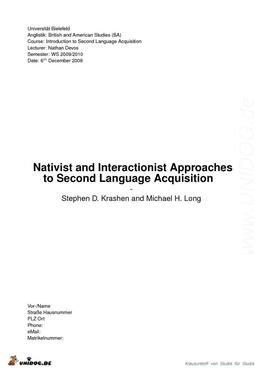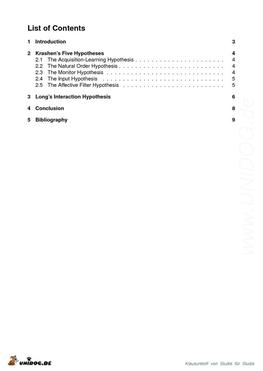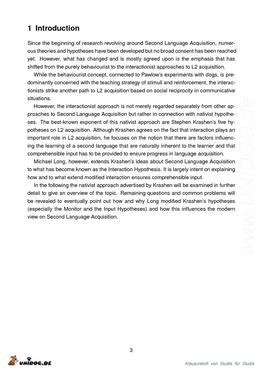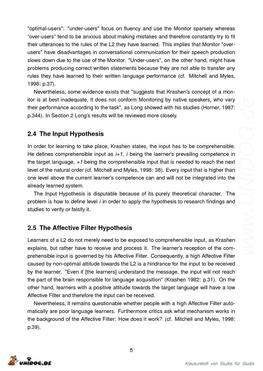| Dokumente | |
|
|
Dokumentvorschau |
| Startseite Universität Bielefeld Linguistik und Literaturwissen... Introduction to Second Languag... |
Nativist and Interactionist Approaches to Second Language Acquisition - S. D. Krashen and M. H. Long |
Dokument-Nr.: F-ABEZ |

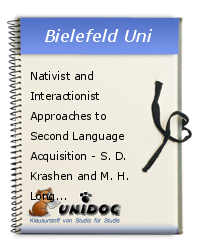
|
|
Dokument-DownloadUm Zugriff auf dieses Dokument zu erhalten, musst Du Mitglied der UNIDOG Community sein. |
|
Inhalt / Beschreibung
List of Contents 1 Introduction
Diese Hausarbeit soll als Hilfe dienen. Eine Nutzung für eigene Zwecke im Sinne von Abgaben etc. ist ausdrücklich untersagt.
1 Introduction
Since the beginning of research revolving around Second Language Acquisition, numerous theories and hypotheses have been developed but no broad consent has been reached yet. However, what has changed and is mostly agreed upon is the emphasis that has shifted from the purely behaviourist to the interactionist approaches to L2 acquisition. While the behaviourist concept, connected to Pawlow’s experiments with dogs, is predominantly concerned with the teaching strategy of stimuli and reinforcement, the interactionists strike another path to L2 acquisition based on social reciprocity in communicative situations. However, the interactionist approach is not merely regarded separately from other approaches to Second Language Acquisition but rather in connection with nativist hypotheses. The best-known exponent of this nativist approach are Stephen Krashen’s five hypotheses on L2 acquisition. Although Krashen agrees on the fact that interaction plays an important role in L2 acquisition, he focuses on the notion that there are factors influencing the learning of a second language that are naturally inherent to the learner and that comprehensible input has to be provided to ensure progress in language acquisition. Michael Long, however, extends Krashen’s ideas about Second Language Acquisition to what has become known as the Interaction Hypothesis. It is largely intent on explaining how and to what extend modified interaction ensures comprehensible input.
In the following the nativist approach advertised by Krashen will be examined in further detail to give an overview of the topic. Remaining questions and common problems will be revealed to eventually point out how and why Long modified Krashen’s hypotheses (especially the Monitor and the Input Hypotheses) and how this influences the modern view on Second Language Acquisition.
|
|
Vorschau-Ausschnitte
|
|||||
